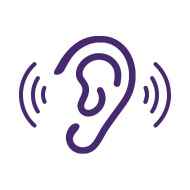Dementia & Hearing Loss
Extensive research by the Lancet Commission has identified hearing loss as one of the highest risk factors for Dementia. The 2020 research has identified 12 risk factors that can lead to Dementia and cognitive decline.
The latest research conducted by the Lancet Commission highlights that leaving hearing loss untreated can result in a heightened risk of cognitive decline and Dementia.
The link between Dementia and hearing loss
Extensive research from the 2020 Lancet report has correlated a strong link between hearing loss and dementia. Hearing loss is estimated to account for 8% of dementia cases globally.

Hearing loss - 8% of dementia cases
Hearing loss is estimated to account for 8% of dementia cases globally.

Hearing loss & dementia
Researchers have a strong correlation between Dementia and hearing loss.
Modifying risk factors
Modifying 12 risk factors might prevent or delay up to 40% of dementias.
Hearing loss & Dementia
An individual is considered to have a hearing loss when thresholds are >20dB and depending on the level of loss would be categorized as mild, moderate, severe or profound. Anything less than 20db is considered satisfactory or hearing within normal range.
The latest research conducted by the Lancet Commission & Dr. Frank Lin highlights that leaving hearing loss untreated can result in a heightened risk of cognitive decline and Dementia.

Hearing loss & cognitive decline
Dr. Frank Lin of the Hopkins University School of Medicine states, Hearing loss is estimated to account for 8% of dementia cases. Dr. Lin highlights some of the possible causes:
(1) Hearing loss can make the brain work harder, forcing it to strain to hear and fill in the gaps. That comes at the expense of other thinking and memory systems.
(2) Hearing loss causes the aging brain to shrink more quickly.
(3) A third possibility is that hearing loss leads people to be less socially engaged, which is hugely important to remain intellectually stimulated.
Untreated hearing Loss
A study has found that nearly 40% of those who recognized they had hearing loss did not inform a doctor or nurse. Unfortunately, not discussing hearing loss can lead to social isolation, depression and reduced quality of life.
If you or a loved one are concerned about hearing loss, we will always recommend a free hearing test with a Qualified Audiologist.
The Audiologist will provide detailed results on a plotted graph called an Audiogram. The Audiogram measures each ear’s hearing threshold and plots the threshold on a graph. This graph allows the Audiologist to identify the type of hearing loss, the hearing threshold, and measurements (mild, server or profound).
The Audiogram allows the Audiologist to identify:
(i) If hearing loss is present
(ii) If the patient is a suitable candidate for hearing treatment
(iii) The Audiogram guides the Audiologists on the frequencies to program the hearing aids

Treatments for hearing loss
Hearing loss can be treated with the use of programmed hearing aids. If a patient is a suitable candidate, the Audiologists with analyze the Audiogram to understand where the person is struggling.
Program hearing aids suitable to the diagnosed hearing loss
Fit the individual with the hearing aids
Conduct a follow-up appointment to make any adjustments required.
Dementia is the loss of cognitive functioning — thinking, remembering, and reasoning. As of 2023, there is an estimated 55 people living with Dementia, with estimated 10 million new cases diagnosed each year.
2020 Research documented in the Lancet report and medical experts has highlighted leaving untreated hearing loss can result in cognitive decline. Dr. Frank Lin of the Hopkins University School of Medicine & Prof Gill Livingston, both notable experts conducting research in this field.
Yes, An Audiologist can program hearing aids tailored to specific hearing loss and requirements.
References:
https://jhucochlearcenter.org/frank-r-lin.html
https://www.thelancet.com/article/S0140-6736(20)30367-6/fulltext
https://www.who.int/health-topics/hearing-loss
https://www.thelancet.com/infographics-do/dementia-risk
https://www.thelancet.com/journals/lanpub/article/PIIS2468-2667(23)00058-0/fulltext
https://www.asha.org/articles/untreated-hearing-loss-in-adults/
https://www.who.int/news-room/fact-sheets/detail/dementia

